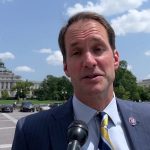Yellen Takes a Stand for U.S. Economic Sustainability: Unraveling the Fitch Downgrade
U.S. Treasury Secretary Janet Yellen vehemently expressed her disagreement with Fitch Ratings’ recent downgrade of the main U.S. credit rating. Given the nation’s economic sustainability and improved governance metrics during the Biden administration, she found it “completely unjustified.” While addressing an IRS contractor office near Washington, Yellen underlined that the rating agency’s evaluation overlooked the resilience of the U.S. economy, citing low unemployment, declining inflation, ongoing growth, and robust innovation.
The Puzzling Decision
Yellen also noted that Fitch’s decision was puzzling, considering the United States’ economic strength. She asserted that the downgrade was based on outdated data and it did not account for the advancements in U.S. governance indicators over the past two and a half years under President Joe Biden’s administration. As per Biden administration officials, Fitch had referenced a decline in U.S. governance under the previous Trump administration when arriving at its conclusion.
Improved Outlook Despite Challenges
However, a July 2022 Fitch report had already revised the U.S. credit outlook to “stable” from “negative.” It acknowledged improved debt expectations, although the report also pointed out Trump’s unprecedented failure to concede the 2020 election. Jared Bernstein, Chair of the White House Council of Economic Advisers, echoed the chorus of dissatisfaction, deeming the downgrade as “peculiar” and “capricious.”
Building a Strong Economy
Yellen’s focus remains on ensuring a sound, growing macro economy that benefits American households at the core of Bidenomics. There are some challenges posed by the Jan. 6, 2021, insurrection at the U.S. Capitol and this year’s debt ceiling fight. However, Yellen and Biden are committed to fiscal responsibility and navigating the economic cycle.
Fitch’s Reasons for Downgrade
Fitch downgraded the U.S. rating by one notch to AA+ from AAA, citing a fiscal deterioration over the next three years. The latter could increase deficits and hinder debt ceiling negotiations. To address this economic problem, Biden reached a debt limit deal with Republicans in June. That included over $1 trillion in deficit reduction over a decade.
Biden’s Proposed Budget and Fiscal Measures
Biden’s proposed 2024 budget aims to reduce deficits by $2.6 trillion over the next 10 years. Yellen also emphasized investments in modernizing the IRS and improving tax enforcement, funded by the Inflation Reduction Act. The latter could result in “hundreds of billions of dollars” in deficit reduction over a decade, further strengthening the economic model.
Transforming Taxpayer Experience
While at the headquarters of 22nd Century Technologies in McLean, Virginia, Yellen emphasized the dedication to modernize the tax system, enabling taxpayers to electronically submit all documents and communications for the 2024 tax season. This move would eliminate manual processing of up to 125 million documents annually, enhancing efficiency and reducing costs, thus tackling economic inactivity.
While the Fitch downgrade has caused concern, Yellen’s firm stance reflects her confidence in the strength of the American economy and its economic sustainability. The Biden administration’s commitment to fiscal responsibility, coupled with innovative measures to improve the tax system, aims to ensure a bright and prosperous future for the United States in the face of any economic problem or fluctuation in the economic cycle.
The post Yellen Takes a Stand for U.S. Economic Sustainability appeared first on FinanceBrokerage.



